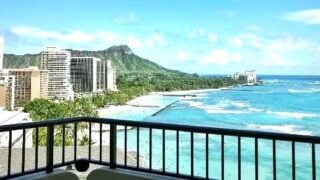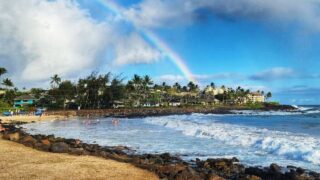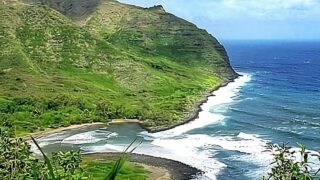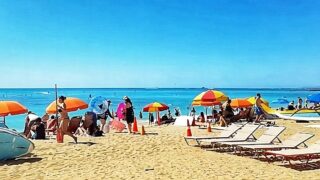Sticker shock is not going away in Hawaii. Hotel rates, rental cars, and restaurant tabs are set to stay sky-high into 2026, even as fewer visitors arrive. UHERO, the State of Hawaii’s research arm, projects arrivals will drop about 5% by mid-2026, with costs for both travelers and residents still climbing.
For visitors, that means the price of a Hawaii vacation is not about to ease. Later in this article we will share strategies we use ourselves to beat Hawaii sticker shock.
A tourism slowdown does not mean lower prices.
Visitor counts from Canada remain low, while those from Japan show no signs of recovery. Even U.S. travelers are showing signs of pulling back. The State expects that trend to continue into 2026.
Yet none of that translates into travel bargains. Hotels do not slash rates when demand dips. They close floors and facilities and cut services instead. Airlines reduce flights, not airfares. Restaurants will trim staffing but still raise menu prices. This is what the industry has learned works. That is why visitors will continue to pay $400+ a night for a room and $100 a day for a car, even when the islands report fewer arrivals.
Why sticker shock sticks.
Inflation in Hawaii remains stuck and is primarily driven by housing, food, and energy costs. Those flow straight into hotel bills, airline tickets, and restaurant menus.
For visitors, the result is familiar: a buffet breakfast that easily exceeds $50, a family trip that costs thousands more than expected, and the nagging question of whether Hawaii is still worth it. For residents, the same forces hit every grocery store visit and electric bill.
The household squeeze is real.
Jobs in tourism are reportedly slowing. Part-time positions with reduced benefits are growing at a faster rate than full-time ones. Wages may tick up, but they do not keep pace with the price of rent or milk. UHERO points to flat real income. That is just another way of saying residents are not getting ahead. And that is an understatement.
Why Hawaii visitors will not find relief.
Elsewhere, a slowdown often means discounts. But not in Hawaii. The cost base is simply too high. Airlines will keep schedules tighter than ever, hotels will manage inventory as they’ve learned to do brilliantly, and restaurants will adjust hours and capacity. None of that is set to lower prices for visitors.
UHERO warns that waiting for Hawaii to get cheaper is simply a mistake. The islands rarely roll back costs once they ratchet up. And that is set to be the case again in 2026.
Tourism downturn masked.
Billions of dollars in public and military projects continue to pour into Hawaii. An $8 billion Navy contract at Pearl Harbor and other federal work are keeping paychecks flowing and cranes in the air, which makes the economy look better from a distance than the tourism numbers suggest.
What 2026 will look like for Hawaii visitors.
Visitors should not expect to pay less for an island vacation next year. Hotels will protect high rates. Airlines will manage capacity. And restaurants will continue to raise prices as their own costs continue to climb. Residents will face more of the same: fewer tips, fewer hours, fewer full-time jobs, and higher bills.
Hawaii remains a dream trip, but the sticker shock is not going away. The state says Hawaii is headed into a mild recession. To anyone paying the bills, both residents and visitors, it feels like another year of paying more for the same Hawaii.
Beating Hawaii sticker shock starts before you book.
The smartest way to save on a Hawaii trip is to plan ahead, using tools like Google Flights and Google Hotels to spot the best prices before you even pack your bags. Editor Jeff found a half price deal on a five-star beachfront property we’re about to tell you about, just that way. You can set price alerts for Google Flights too, another of our strategies.
We also find that traveling mid-week rather than on busy weekends often saves hundreds, and shoulder seasons, such as May or September, usually deliver the lowest fares.
For rental cars, we primarily turn to Costco Travel and Priceline, and we continually monitor prices up to the day of departure to make sure we have the best deal. It’s worth checking Autoslash and Discount Hawaii Car Rentals for their Hawaii rentals too.
When it comes to hotels, it pays to compare OTA’s with direct booking, as properties sometimes offer unadvertised discounts or extras, such as parking or resort credits. Honestly, sometimes there appears to be no logical explanation for where you’ll find the best hotel deal. For those using points or companion certificates, pairing them with careful flight timing can further reduce costs.
What about you? Have higher costs changed your plans for 2026
UHEROForecastForTheStateOfHawaii25Q3Get Breaking Hawaii Travel News







A great alternative is the Visit Las Vegas 50% off sale good until midnight today. Those who want to save money can visit the Ninth Island for huge savings with less or no time flying.
I can never understand why more don’t look at STR. What most people do not realize is that many of these “so-called resorts” each unit is privately owned. We are taxed on Hotel property tax (yes, Hotel, even when you don’t have an oven, and yet there is a restaurant on the property). There is a front desk, but that does not mean every owner pays a % for utilization of a front desk. Vacation Shoppers need to be more savvy and will find fantastic deals, take that savings, and enjoy a dinner out or a sunset cruise. Airbnb and VRBO are perfect for searching. Hotels are big, expensive and corporate.
We’re going to enjoy every minute of our 6 week trip to Maui as it may be our last. This is sad
6 weeks sounds incredible!! Where do you stay/ what type of accommodations do you use? Do you move to multiple locations? Do you make an itinerary?
Tax & spend government officials are at the heart of the Hawaii problems. Three things hurt Maui.
1st Covid
2nd Hurricane induced wildfires where old and worn utility poles snapped with fires resulting.
3rd Mayor Bissen and his STR agenda being a reason for visitors not make reservations to Maui. The uncertainty keeps them away hurting the local economy.
Grocery stores, restaurants, house cleaners, tour guides, sea adventures, rental establishments, golf enthusiasts, rental companies, resorts and others stop money from coming in to the economy.
Hawaii’s solution to lower tourist bookings….raise those prices! A guaranteed tourist magnet! (ROFL).
The reality is that the middle class has effectively been shut out of the islands which are in the process of becoming an enclave for the very rich. “Greed is good”. Priceline is a good deal but let me share one trick, never buy the opening page offers. I find hidden specials on later page 6, $22. Vs $70 on pg 1 (same car, same vendor)
As my Tutu used to say “careful what you ask for”.
One way to trim costs: Stay at a short term rental.
Less expensive than a hotel and you can make your own meals. Then, take those savings and eat at a restaurant a few times and tip generously when you do.
A sorry scenario. As much as I dislike the thought, just may have to bank my weeks and travel elsewhere … Or stay home. :0/
Why is there no mention of vacation rentals? Hotel lobbiests putting on the squeeze? Hotels are little boxes piled on top of each other, with fees for almost everything you need or want, parking being a great example, lack of being able to cook your own meals being another. Is this “Hawaii Travel News” article just another example of who controls your informtion input?
“Hotels do not slash rates when demand dips.”
Balderdash!
In the wake of the Great Recession (2008-2011), we were staying at the Four Seasons Manele for $275/night, at the Four Seasons Koele (now the Sensei) for $225/night, and the Grand Wailea for $295; when all these resorts had been charging $500-$800 in 2007.
If there is another significant recession and tourism drops, resorts will once again charge reasonable prices. Until then, they will continue to charge whatever the market will bear.
Another tip is to monitor your already-booked flight and hotel room for a price drop. I booked a United Airlines first class ticket for mid-January 2026 back in March 2025 for $6,650. I kept checking the price several times a week and in June price for the ticket had dropped by $1,089.01 so I called United and got a travel credit for that amount. And just today the ticket price went down another $836.16 so I called United again this morning and got another future travel credit for that amount. So the ticket price now stands at $4,724.83. I’m not expecting it to drop much further. — Also my Halekulani hotel room dropped in price by about 8% since I booked it in March so I called them and had the rate adjusted down. Easy. Just babysit your existing airline and hotel reservations, you will often catch price drops.
Spot on, I use Costco Travel for car rentals primarily, I also use Hawaii Discount and have found they both offer the best rates, options of cars, and agencies. I book a car early, then periodically check on the rental rates and if they go lower, cancel the original reservation and re-book with the new lower cost reservation. Both Costco and Discount Hawaii offer this option without penalty to prepayment. But, you have to take the time to periodically check the rates.